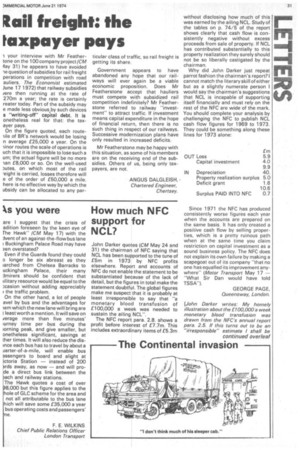tail freight: the taxpayer pays
Page 33

If you've noticed an error in this article please click here to report it so we can fix it.
-I your interview with Mr Feathertone on the 100 company project (CM lay 31) he appears to have avoided -le question of subsidies for rail freight perations in competition with road auliers. The Economist estimated June 17 1972) that railway subsidies /ere then running at the rate of 270m a year; the rate is certainly reater today. Part of the subsidy may
e made less obvious,by such devices s "writing-off" capital debt. It is onetheless real for that: the taxayer pays.
On the figure quoted, each route:lite of BR's network would be losing
n average £25,000 a year. On the iinor routes the scale of operations is uch that it is impossible to lose such a urn; the actual figure will be no more Ian £8,000 or so. On the well-used putes, on which most of the rail -eight is carried, losses therefore will
e of the order of £50,000 a mile, here is no effective way by which the ubsidy can be allocated to any par ticular class of traffic, so rail freight is getting its share.
Government appears to have abandoned any hope that our railways will ever again be a viable economic proposition. Does Mr Featherstone accept that hauliers must compete with subsidized rail competition indefinitely? Mr Featherstone referred to railway "investment" to attract traffic. If investment means capital expenditure in the hope of financial return, then there is no Such thing in respect of our railways. Successive modernization plans have only resulted in increased deficits.
Mr Featherstone may be happy with this situation, as some of his members are on the receiving end of the subsidies. Others of us, being only taxpayers, are not.
ANGUS DALGLEISH, Chartered Engineer, Chertsey.








































































































